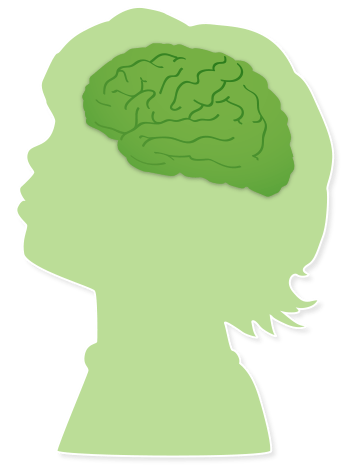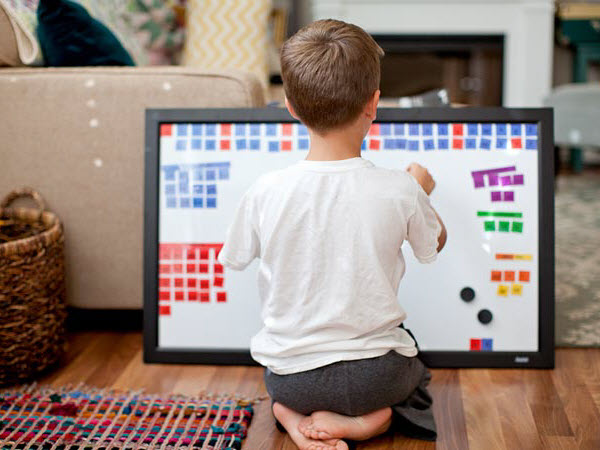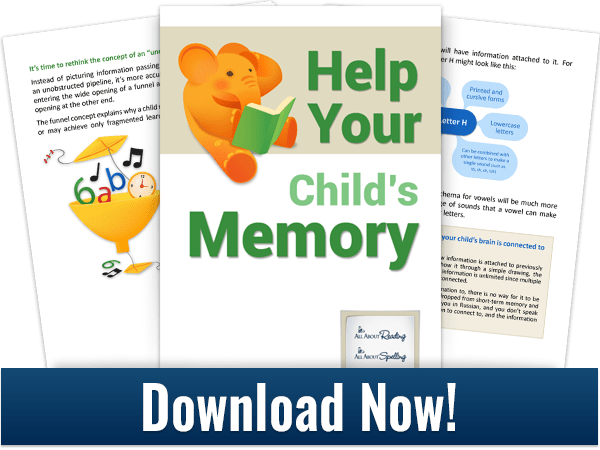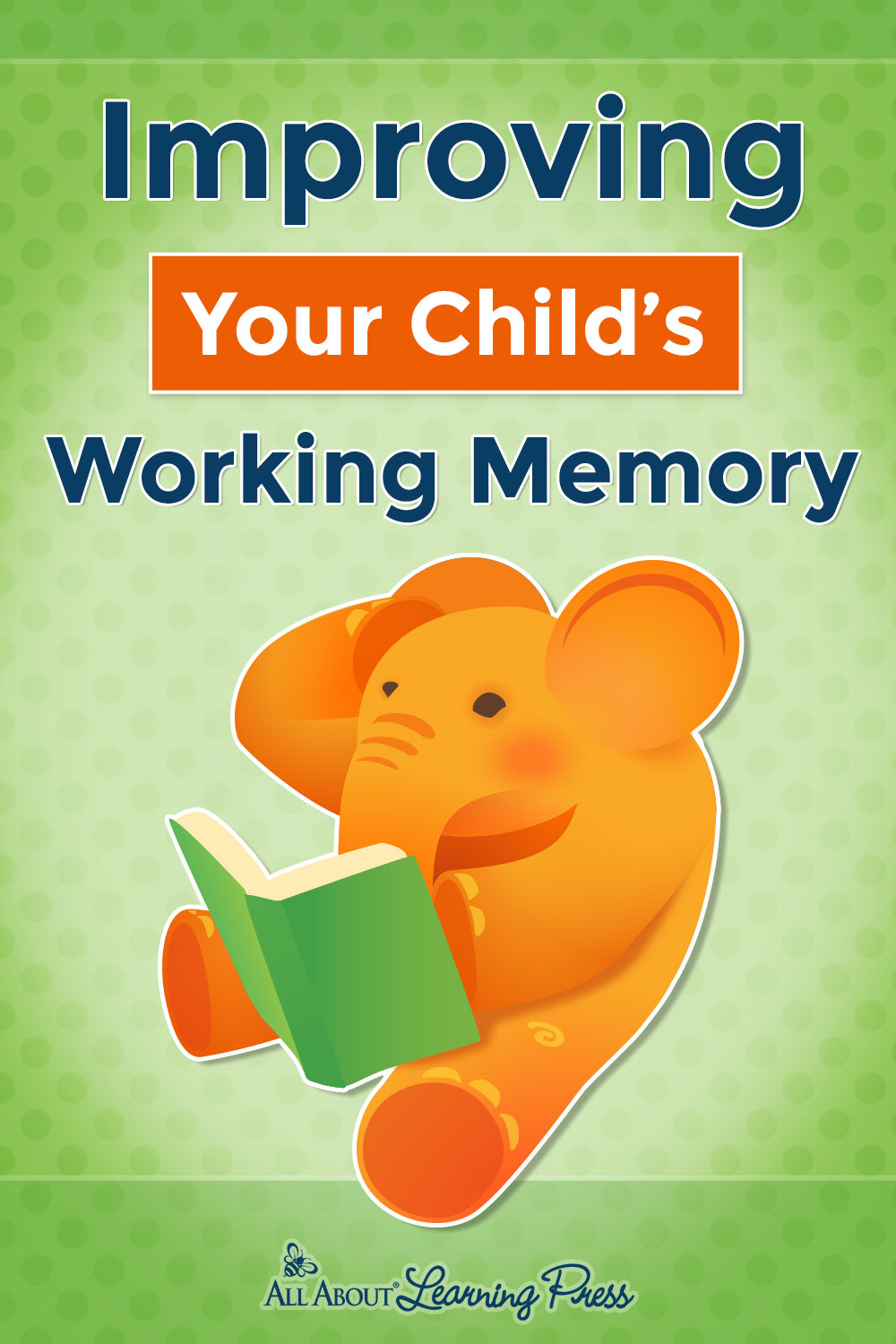Improving Your Child’s Working Memory

Have you ever been introduced to someone only to realize five minutes later that you can’t recall their name?
Or maybe you’ve experienced this one: you suddenly remember that you need to add something to your shopping list, but by the time you find a pen, you can’t remember what you were going to write.
Have you ever been frustrated by your child’s inability to remember a short list of tasks you’ve asked him to accomplish?
The examples above demonstrate the potential shortcomings of the working memory. Inevitably, we all face these issues from time to time. But for a child with more significant memory challenges, these issues can have a dramatic impact on the learning process. Is there hope? YES! But let’s back up to consider several important questions.
What Is Working Memory?
Working memory is the ability to hold information in your brain for a short period of time while you work with or manipulate the information. Working memory is critical for learning to read and spell.

For example:
- It helps you sound out unfamiliar words.
- It helps you keep your place in the text, allowing you to look away from the page yet still find your place again.
- It helps you remember the words you just read as you finish the sentence or paragraph, enabling better comprehension.
- It makes it possible for you to compose a cohesive paragraph, writing down one sentence while you think of the next.
Working memory is one of the most important indicators of how easily a child can learn. In fact, research has shown that working memory is actually a much better indicator than an IQ score of how easily a person can learn.
Signs Your Child Has Poor Working Memory
Children with poor working memory will struggle with tasks that require them to hold some information in their minds (such as a dictated sentence) while doing something else that is challenging to them (such as spelling the words). Without some adaptations, a child may fail to complete a task because crucial information (in this case, the remainder of the sentence) is dropped from their memory and is no longer available to them. It may appear that the child is not paying attention, but in reality, the child may simply have forgotten what he or she is supposed to do.
In addition, children with poor working memory may have one or more of the following problems.
- They may have difficulty paying attention to lessons.
- They may seem uncooperative during learning activities.
- They may fail to comprehend what they are reading.
- They can’t follow a string of instructions.
- They “space out” during lessons.
- They seem forgetful.
- They often misplace things.
- They struggle to complete multistep activities.
- They often forget what they were going to say.
6 Ways to Build Your Child’s Working Memory
As you implement the six ideas below, you will begin to see improvement in your child’s working memory.
- Avoid information overload. When too much information is presented in a lesson, your child’s working memory becomes overloaded.
- Eliminate distractions. When your child is working, try to reduce distractions such as TV or radio in the background, siblings or classmates talking, and toys or other interesting activities nearby.
- Make sure your child is comfortable during lessons. Physical stress (from things like headaches, an uncomfortable chair, hunger, being too hot or too cold, and eye strain due to vision issues or from facing a bright window) can have a negative effect on working memory.
- Read aloud every day for at least 20 minutes. When you read aloud, your child has to recall what you just read and anticipate what is coming next. All the while, he is interpreting the words and comprehending the story.
- Do motivating activities with your child that require following instructions, such as crafts or recipes. She should read one or two simple steps and then complete them. (Depending on your child’s reading level, either you can read the instructions or she can.) This will exercise and stretch your child’s working memory.
- Play games that build memory skills. Concentration-style and matching games are a great option. Hedbanz is another great memory-building game the whole family will enjoy playing together.
And above all, have patience! This might be the hardest part! Be encouraging, and keep emotional stress to a minimum. If your child is worried about performing properly or disappointing you, that just adds another layer of stress that taxes working memory even more.
AAR and AAS Work Well for Kids with Working Memory Challenges
All learning involves working memory, and I made sure that the lessons in our programs reduce unnecessary load on the working memory.
- Lessons are short and focused on just one concept at a time.
- When there are activities involved, we give only one or two instructions at a time, and the scripted verbal instructions are easy to understand.
- The lessons follow the same routine each day. This lessens the demand on working memory because the student knows what to expect, making it easier to focus on the lesson.
- The letter tiles are color coded, giving the students visual cues as to what category they belong to on the magnet board.

- With our mastery-based program, we make sure that students understand the basics before asking them to move on to a more complex task. For example, before asking a student to comprehend the sentence The hawk sat on her nest, we make sure that the child is able to easily decode the word hawk. Because the sounds of the phonogram AW have already been mastered, the child’s working memory is freed up to work on comprehension.
- Crucial information is reviewed frequently. This pushes the information into long-term memory, freeing up working memory space.
An effective working memory is a necessary part of the learning process. But the good news is you can help strengthen your child’s working memory! With a bit of extra effort, you will both see big rewards!
Additional Help for Your Child’s Memory
Download my free e-book, “Help Your Child’s Memory,” to learn more techniques to help strengthen your child’s memory and achieve learning that really sticks.

In this e-book, you will discover…
- Why information goes right over your child’s head … and what to do about it
- How the “Funnel Concept” can improve your teaching and result in long-term learning
- Schemas—what they are and how they help improve memory
- What “Simultaneous Multisensory Instruction” is, and why it is such a powerful teaching method
- Six things you can do today to improve your child’s working memory
Photo credit: Rachel Neumann









Vivian Guirguis
says:Thank you very much for sharing.
I really appreciate it very much.
It is a very good guiding tools to help children in a fun way.
Robin
says: Customer ServiceYou’re welcome, Vivian.
Ateca Wiliams
says:Thank you so very much for clearly setting out, so it is easily understood, all about Working Memory. May you be richly blessed for your generous heart.
Robin
says: Customer ServiceYou’re welcome, Ateca. And thank you! I’m glad this was helpful and easily understood.
Cathy
says:Do you have any suggestions for an older child (14) with working memory issues?
Robin
says: Customer ServiceCathy,
The tips given in this article are applicable for people of all ages!
Avoid information overload. Focus instruction on one concept at a time.
Eliminate distractions. No one learns well when there is noise and movement all around them.
Be comfortable. Discomfort is another form of distraction.
Listen to books read aloud (either someone reading or audiobooks). This is extremely helpful for building memory and also comprehension ability.
Keep learning motivating. Everyone does better at learning they enjoy.
Play games that build memory. Not only boardgames, but a lot of video games can strengthen this skill as well.
June Wenzel
says:These tips sound easy and practical. Important for them to be done regularly.
Robin
says: Customer ServiceThank you, June!
Mrs.Scott
says:I have down loaded but I have images but no writing can you please send it to me.
Robin E.
says: Customer ServiceI’m sorry to hear this did not download properly for you, Mrs. Scott. I’ve emailed it to you.
advanced academy
says:Thank you very much for this! This is truly insightful. Improving a child’s working memory is really essential because it builds on the important foundation of recalling facts and information, which can be long-term or short-term memory. The steps you have highlighted are definitely right and accurate for improving your child’s working memory. This is a wonderful article, thanks for sharing.
Robin E.
says: Customer ServiceThank you!
Molly
says:Thank you so much for posting this information!
Robin E.
says: Customer ServiceYou’re welcome, Molly!
YaadStyle Homeschooling
says:Thanks again for all your help.
Leah Hug-Hernandez
says:I absolutely LOVE this curriculum! My girls LOVE it too! This is the way I remember learning to read when I was a kid. Thank you so much! You all did an AmaZing job putting this together. Well thought out, simple, easy to understand and teach.
Robin E.
says: Customer ServiceOh, thank you, Leah! I’m happy to hear that your girls are enjoying it so much!
Karissa
says:These are great tips. They also serve as a good reminder of ways for me to improve my own memory by cutting distractions and playing more games with my kiddos!
Robin E.
says: Customer ServiceSuch a great point, Karissa! It is all too easy as a parent to be distracted.
BF
says:This was very helpful. I think both of my kids struggle with working memory.
Robin E.
says: Customer ServiceI’m glad this was helpful for your kids!
Julie
says:Such a helpful article with such great information. I’ll be working on these tips with my kiddos-especially the info overload and reducing the distractions.
Robin E.
says: Customer ServiceI’m so pleased to hear this is helpful for you, Julie!
E Kemp
says:From South Africa I want to thank you for your guidance. Our mother tongue is not English but we can work benefit from your information. Our children need this desperately.
Robin E.
says: Customer ServiceI’m glad this was helpful for you. You’re welcome.
Holly
says:What a great article. My daughter has really struggled with reading, phonics and spelling and I wonder if working memory is part of the problem.
Robin E.
says: Customer ServiceI’m glad this article was helpful, Holly. However, if you have specific questions or concerns, please let me know. I’m happy to help!
Holly
says:I wish I had known about this program earlier.
My daughter has struggled with reading and spelling for years.
Carla
says:This post has such helpful reminders. While teaching my son, I’ve sometimes confused his difficulty with rapid automatic naming (ex. saying math facts or phonograms quickly) as a working memory challenge, which–according to his assessments–it is not. I am interested in learning more about the differences between working memory, longer term memory, and rapid automatic naming, especially when it comes to dyslexia. Thanks!
Robin E.
says: Customer ServiceCarla,
I’m glad this post was helpful for you regarding working memory.
Whereas working memory is information we hold in our minds for just a minute or so (like remembering a phone number someone has just told you long enough to write it down), long-term memory is information that is stored indefinitely (like your own phone number). Items in the long-term memory can be forgotten if they aren’t accessed and reviewed periodically, however (like maybe your childhood phone number, you probably once could rattle it off without thought, but maybe now you are unsure of the order of the numbers).
Rapid automatized naming is the ability to translate visual information into phonological code, such as names. (It is sometimes called “rapid naming ability” as well.) Dyslexic students often struggle with rapid naming, so that while they see a 4 and understand the concept of 4, they may struggle to be able to say, “four.” There seems to be a delay in the mind between concepts and names of the concepts.
Here are some ways you can help your son with rapid naming:
– Flashcards are great for this, not only when used as typical flashcards but also used for games for review. This is an important reason why All About Reading and All About Spelling include flashcards. Our How to Teach Phonograms blog post speaks about using flashcards for learning and reviewing phonogram sounds and includes a few games for fun review.
– Rereading material more than once is very helpful. All About Reading includes “Warm Up Sheets” to be read before every story. These sheets include words, phrases, and sentences from the story so students can practice before reading the story for the first time. This improves fluency in reading. We also recommend Buddy Reading with Your Child as a helpful activity, as is a technique called “echo reading”. With echo reading, the teacher reads a few sentences with full expression, and then the student reads the same sentences, matching the expression as close as possible.
– Many games are excellent for strengthening rapid naming. Check out our recommendations for Games that Build Language Skills.
– Not related to reading and spelling, but with my own students, I found that using math facts was the most effective means of learning them. I had each student spend a few days filling out a math addition table and a multiplication table and then I laminated them and allowed the student to use them whenever they needed a math fact. In time, they found it easier to just “know” a fact instead of looking it up on the table. It took a few years for at least one of them to master all the multiplication facts up to 12 times, but it worked and much less painfully than drills and worrying about when they “should” memorize them.
I hope this helps some, but if you have specific questions or concerns, please let us know. I’m happy to help further. Our email is support@allaboutlearningpress.com.
Teal
says:love this!
Robin E.
says: Customer ServiceThank you, Teal!
Desirea Tegg
says:Love the tip about playing games like Hedbanz to improve memory skills!
Robin E.
says: Customer ServiceThank you, Desirea!
Dawn
says:Thank you for the great hints!
Robin E.
says: Customer ServiceYou’re welcome, Dawn!
Overwhelmed mama
says:Very interesting information!
Thank you for that and the give away offer
Robin E.
says: Customer ServiceThank you!
nicole
says:I love using multusensory learning techniques. It really helps student see, feel, and understand sound letter relationships when word building
Robin E.
says: Customer ServiceYes, great points, Nicole! Thank you.
Paula
says:Thanks for the info and tips. I especially love how reading aloud is tied in.
Robin E.
says: Customer ServiceYou’re welcome, Paula. And yes, reading aloud to students is such an important activity for so many reasons!
Sarah S.
says:I think I need this for myself more than my kids,
Robin E.
says: Customer ServiceI can understand that, Sarah! I think a part of it for many of us parents is point #2 Eliminate Distractions. Too often a parent’s focus is pulled in a dozen different directions!
Amber
says:I appreciate the thoughtfulness behind this resource! I, myself, have had troubles with my working memory. I’m glad that I can be educated about this to help my children learn in a healthier way.
Robin E.
says: Customer ServiceI’m glad this will be helpful for you and your children, Amber.
Jess
says:We homeschool now and it all makes a lot of sense as my son has trouble focusing on anything. If I can incorporate the above strategies it makes a huge difference to his ability to learn. No wonder he didn’t cope in a classroom.
Robin E.
says: Customer ServiceJess,
Yes, classroom learning can be difficult for some students. I’m pleased to hear these strategies are helping your son succeed with homeschooling.
Robin
says:My kids love matching games and I can’t wait to incorporate them more
Robin E.
says: Customer ServiceSounds great, Robin! Matching games are a lot of fun.
Kathleen M Thomas
says:Great information. I’m going to try games to improve my child’s working memory.
Robin E.
says: Customer ServiceGames are wonderful tools for learning, Kathleen!
Laurie
says:I worry about my girls’ working memory, so I think we’ll be playing some more matching games.
Elizabeth H
says:Great info!
Robin E.
says: Customer ServiceThank you, Elizabeth!
Bonnie
says:Great!